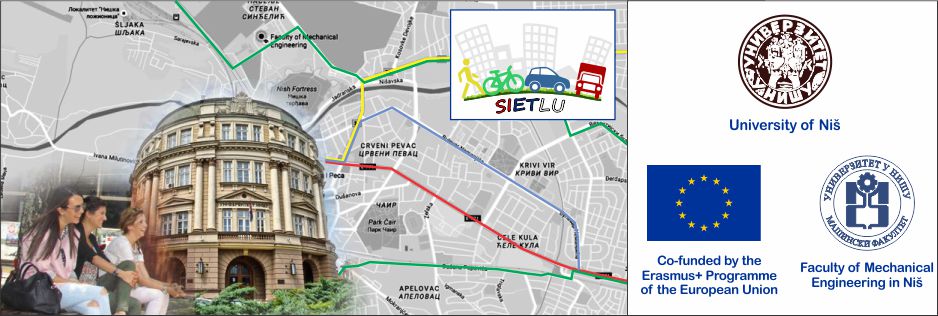ACTIVITIES
The Module consists of eleven teaching activities per year (divided in four thematic courses), one students seminars (each year), one conference (in second year), Module website and one course book or other academic publication which aim is to fill the gap in the existing literature on Serbian language (in third year).
Module starts with website creation (November 2016.) and Module promotion on University of Niš (by leaflets), in local medias and on the Internet (December 2016).
At the beginning of each school year, all students must enrol in the module by online application on Module website.
Each year teaching activities will start on February by Lectures 1 and 2 with aim to familiarize students with interdisciplinary program of European Studies and with the most important EU legislation on transport and logistics policy.
L1. European Studies - interdisciplinary program;
L2. EU institutions, bodies and legislation on transport and logistics policy.
The second course (urban and sustainable logistics) will be realized through Lectures 3 and 4 in March.
L3. Smart and sustainable logistics for a competitive Southeast region of Serbia - experience of European cities;
L4. Urban freight transport.
The Module continues with third thematic course (ICT and Intelligent transport systems) in April with Lectures 5 and 6.
L5. Intelligent transport systems in urban context;
L6. ICT concepts for efficient mobility in smart cities
The last five teaching activities (Lectures 7,8,10 and Training courses 9,11), with a common name Environment protection and energy efficiency, will be realized in May and June.
L7. Sustainability as a basis for urban development.
L8. Pollution management in urban areas.
TC9. Waste transport and logistics in urban areas.
L10. Potentials and limitations of energy efficiency in logistics.
TC11. Alternative fuels in public transportation.
Each Module school year ends with students seminar where students share aspects of their research, as it develops with their advisors, through oral presentation of seminar work (essay) in front of the colleagues and other interested academics and students. Finally, in order to graduate the Module, students have to pass a written exam. Students who have successfully completed these requirements could apply for a Certificate.
The new cycle of courses starts next year in November with a new group of students and according to the same schedule as in the previous year.

 English (UK)
English (UK) Српски-ћирилица
Српски-ћирилица 